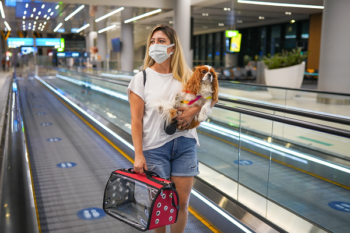
Many of us have stayed put for the past two years and we’re more than ready for new travel adventures in 2022! But it won’t be the same as compared to before the Covid-19 pandemic. Plans may need to be changed or canceled at the last minute, wait times are longer, and stricter rules and protocols have been put in place. As you start to plan your next adventure, here’s a list of things to consider that will help make traveling with your pet a success.
Check travel regulations for your destination and mode of transportation
At least three months in advance, research travel rules and regulations set by the destination country and transportation method (airline, train, cruise, etc.). Find out what paperwork needs to be signed, what certificates need to be presented, and which vaccines are mandatory. Research various transportation methods and companies to determine the most suitable option for your pet.
Prepare to keep your pet healthy while away
Research any potential risks in the area you are visiting and have a plan to address them. Some countries have infectious diseases or parasites that may threaten your pet (or you). Look into how different the climate will be. Is it very hot where you are going? Could the area be facing a drought, tropical storm, or tornado?
It would be prudent to search local veterinarians in the area where you and your pet will be staying. When you find a clinic you feel confident about, ask if you can start a patient file for your pet and send medical records. Doing this can save a lot of time in the event of an emergency! Ask the veterinary staff about any high-risk diseases and parasites to be aware of so you can then relay the information to your regular veterinarian.
Knowing where the nearest pet supply shops are will be helpful if you forget something at home or need to grab something in a pinch like a new ID tag or first aid supplies.
Schedule an appointment with your veterinarian
Your veterinarian should examine your pet to ensure it is healthy enough to travel. Diagnostic testing may be recommended if your pet has a chronic illness or your veterinarian suspects anything unusual.
When this appointment should occur may be dictated by your destination’s regulations (i.e., up-to-date Rabies vaccination administered more than 21 days before travel).
Be prepared for the appointment! Bring any paperwork to be signed, know which vaccines and/or titers are required and when, determine which medications need to be prescribed or refilled, and if and which additional parasite prevention medication is needed. Prepare notes ahead of the appointment so you do not forget anything.
Have a backup plan
Given the unpredictability of travel during the Covid-19 pandemic, it’s critical to have a backup plan! It’s not unheard of that a pet is denied travel privileges on the day of departure. A step can easily be overlooked, regulations can change without notice, your pet may become unfit for travel due to illness or injury – these are just a few possibilities to keep in mind when planning your trip. It’s important to know how you will handle these situations should they arise. Will you cancel your trip if your pet can no longer go? Do you have a pet sitter or kennel ready at a moment’s notice? Making these decisions ahead of time will save you a lot of stress if things don’t go as planned.
Most importantly, ensure your pet is emotionally prepared for travel
Especially for pets unaccustomed to travel, it can be an overwhelming experience. The airports and train stations can be loud and crowded, the trip can be bumpy and, in some cases, lonely if the pet is stowed as cargo. Familiarize your pet with these novel experiences well in advance to minimize stress on the day of travel, whether it’s socializing in busy places, obedience practice, or crate training, and aim to make these experiences happy ones (lots of treats and positive reinforcement).
You can consult your veterinarian for advice to minimize your pet’s stress for travel. Some pets may do better with prescription anti-anxiety and anti-nausea medication, sedatives, or synthetic pheromones. Your veterinarian can best advise you based on the needs of your pet.